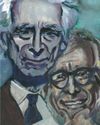
Over seventy years ago, Alan Turing developed the simple but powerful idea that any solvable mathematical problem can in principle be solved with a ‘universal computing device’. The type of device he described in his 1936 paper became known to researchers as a ‘Turing machine’. Ever since we have been trying to create artificial intelligence by programming electronic machines. Most of the current research in the field of AI is indeed just an acceleration of that first universal Turing machine. Turing is also responsible for another fundamental idea that has shaped research in this area. The Turing test makes us ask: if we cannot distinguish whether we are holding a dialogue with a person or a machine, then does it really matter what is in front of us – a machine or a human – since we’re dealing with intelligence anyway?
The Merriam-Webster Dictionary defines intelligence as ‘the ability to learn or understand or to deal with new or trying situations’. Turing’s idea of using language as a tool for comparing machine and human intelligence, based on how well a machine can pretend to be human, is both simple and profound. Thanks to this idea, such wonderful things as voice assistants and online translators have come to life.
هذه القصة مأخوذة من طبعة April/May 2023 من Philosophy Now.
ابدأ النسخة التجريبية المجانية من Magzter GOLD لمدة 7 أيام للوصول إلى آلاف القصص المتميزة المنسقة وأكثر من 9,000 مجلة وصحيفة.
بالفعل مشترك ? تسجيل الدخول
هذه القصة مأخوذة من طبعة April/May 2023 من Philosophy Now.
ابدأ النسخة التجريبية المجانية من Magzter GOLD لمدة 7 أيام للوصول إلى آلاف القصص المتميزة المنسقة وأكثر من 9,000 مجلة وصحيفة.
بالفعل مشترك? تسجيل الدخول

FALLING DOWN
Thomas R. Morgan considers how personal identity is maintained, and how it is lost.

Pythagoras (570-495 BCE)
Daniel Toré looks beyond the mathematician to the philosopher.

Wordsworth & Darwin
Christine Avery wonders whether poetry can help us to deal with science.

Plants & Philosophy
Caroline Deforche sees similarities between gardening and philosophising.

Dr.Gindi sculptor, has a philosophical conversation with Richard Baron about sensation, life, infinity and, you guessed it, sculpture.
Dr. Gindi is one of Switzerland's foremost sculptors, whose work has been exhibited in many countries.

Thomas Aquinas on Extraterrestrial Life
Babatunde Onabajo tells us why Aquinas did not believe in aliens.

The Fire This Time
Tim Madigan on Ray Bradbury, Bertrand Russell and Fahrenheit 451.

Trust, Truth & Political Conversations
Adrian Brockless wants a recognition of human value in political debate.

Philosophy & The Crown
Vincent Di Norcia on monarchy and stability.

Technologists & Ethicists
Stephen L. Anderson laments inadequate moral insight among tech leaders.